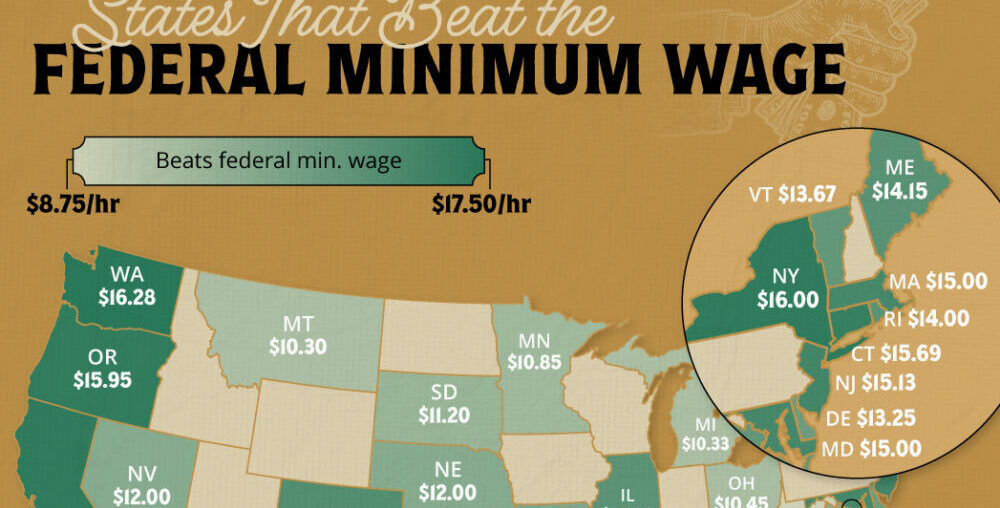U.S. States Paying More Than the Federal Minimum Wage
This was originally posted on our Voronoi app. Download the app for free on iOS or Android and discover incredible data-driven charts from a variety of trusted sources.
The real value of the federal minimum wage ($7.25/hour) has declined steadily since it was last raised 15 years ago.
As discussions around increasing it continue, several states have taken matters into their own hands—by implementing and raising state minimum wages.
We map out the U.S. states that pay more than the federal minimum wage and list their minimums. Data for this graphic is sourced from the Federal Reserve, as of 2024.
Ranked: State Minimum Wages
Thirty states have a minimum wage that’s higher than the federal minimum of $7.25/hour.
| Rank | State | Minimum Wage ($/hr) |
|---|---|---|
| 1 | Washington D.C.* | 17.50 |
| 2 | Washington | 16.28 |
| 3 | California | 16.00 |
| 4 | New York | 16.00 |
| 5 | Oregon | 15.95 |
| 6 | Connecticut | 15.69 |
| 7 | New Jersey | 15.13 |
| 8 | Maryland | 15.00 |
| 9 | Massachusetts | 15.00 |
| 10 | Colorado | 14.42 |
| 11 | Arizona | 14.35 |
| 12 | Maine | 14.15 |
| 13 | Hawaii | 14.00 |
| 14 | Illinois | 14.00 |
| 15 | Rhode Island | 14.00 |
| 16 | Vermont | 13.67 |
| 17 | Delaware | 13.25 |
| 18 | Missouri | 12.30 |
| 19 | Florida | 12.00 |
| 20 | Nebraska | 12.00 |
| 21 | Nevada | 12.00 |
| 22 | New Mexico | 12.00 |
| 23 | Virginia | 12.00 |
| 24 | Alaska | 11.73 |
| 25 | South Dakota | 11.20 |
| 26 | Arkansas | 11.00 |
| 27 | Minnesota | 10.85 |
| 28 | Puerto Rico | 10.50 |
| 29 | Ohio | 10.45 |
| 30 | Michigan | 10.33 |
| 31 | Montana | 10.30 |
| 32 | West Virginia | 8.75 |
| 33 | Alabama | 7.25 |
| 34 | Georgia | 7.25 |
| 35 | Idaho | 7.25 |
| 36 | Indiana | 7.25 |
| 37 | Iowa | 7.25 |
| 38 | Kansas | 7.25 |
| 39 | Kentucky | 7.25 |
| 40 | Louisiana | 7.25 |
| 41 | Mississippi | 7.25 |
| 42 | New Hampshire | 7.25 |
| 43 | North Carolina | 7.25 |
| 44 | North Dakota | 7.25 |
| 45 | Oklahoma | 7.25 |
| 46 | Pennsylvania | 7.25 |
| 47 | South Carolina | 7.25 |
| 48 | Tennessee | 7.25 |
| 49 | Texas | 7.25 |
| 50 | Utah | 7.25 |
| 51 | Wisconsin | 7.25 |
| 52 | Wyoming | 7.25 |
| N/A | Federal Wage | 7.25 |
*Federal district.
Of them, Washington ($16.28/hr) and California ($16.00/hr ) are the highest. Both states are expensive to live in, as evidenced by how far $100 will take you (not very) in each.
However, the country-wide crown goes to Washington D.C., ($17.50/hr) where the minimum is tied to inflation.
Eighteen states either match the federal benchmark, or don’t have a state minimum at all (which makes the federal minimum applicable).
Two states—Wyoming and Georgia—have a state minimum wage that’s below $7.25/hour but in this case the federal wage takes effect.
What is the Minimum Wage Discourse?
The minimum wage debate in the U.S. involves two main opposing viewpoints. Proponents argue that raising the minimum wage is necessary to boost living standards for low-wage workers, reduce poverty, and narrow income inequality. They say that moderate increases have minimal impact on employment and can stimulate consumer spending.
Key to their argument is that this is also the longest time the federal minimum has not seen an increase, since its inception in 1938.
| Year | Nominal value ($/hour) |
|---|---|
| 1940 | 0.30 |
| 1945 | 0.40 |
| 1950 | 0.75 |
| 1955 | 0.75 |
| 1960 | 1.00 |
| 1965 | 1.25 |
| 1970 | 1.60 |
| 1975 | 2.10 |
| 1980 | 3.10 |
| 1985 | 3.35 |
| 1990 | 3.80 |
| 1995 | 4.25 |
| 2000 | 5.15 |
| 2005 | 5.15 |
| 2010 | 7.25 |
| 2015 | 7.25 |
| 2018 | 7.25 |
| 2019 | 7.25 |
| 2020 | 7.25 |
| 2021 | 7.25 |
| 2022 | 7.25 |
| 2023 | 7.25 |
On the other hand, opponents claim that significant minimum wage hikes could lead to job losses, particularly for low-skilled and young workers. This could potentially increasing poverty rates for some groups.
They argue that it may price low-skilled workers out of the job market and harm small businesses with slim profit margins. Both sides cite economic studies to support their positions, but the debate ultimately reflects deeper societal values about fairness, opportunity, and the role of government in the economy.
Since 2017, the Raise the Wage Act has been introduced to Congress every year in an effort to increase the federal minimum. All the bills have not passed the legislature so far.
Learn More on the Voronoi App 
Current “Raise the Wage” proposals look to increase the minimum to $17/hour. In the Share of Workers Earning Less Than $17/Hour we map out which states would see the most changes.

